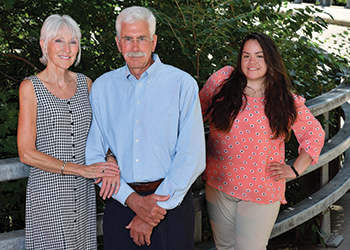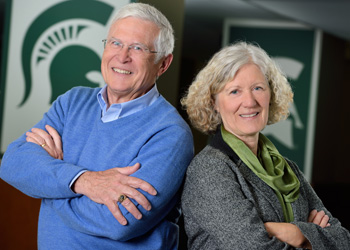Celebrating the First Class: MSU Graduates Five MasterCard Foundation Scholars
MSU received $45 million to become a lead partner in The MasterCard Foundation Scholars Program. Throughout the nine-year program, MSU will welcome 100 four-year undergraduates and 85 master’s degree students from Africa.
Celebrating the First Class: MSU Graduates Five MasterCard Foundation Scholars
MSU received $45 million to become a lead partner in The MasterCard Foundation Scholars Program. Throughout the nine-year program, MSU will welcome 100 four-year undergraduates and 85 master’s degree students from Africa.
October 6, 2014Two years ago The MasterCard Foundation partnered with Michigan State University to provide talented, yet financially disadvantaged youth from Sub-Saharan Africa with access to high-quality education. This spring marked the graduation of the first five MasterCard Foundation Scholars.
The graduates are from Uganda, Mozambique, Zambia, Ghana and Nigeria. All of them plan to return home and pursue careers in sectors ranging from plant biotechnology and food safety to public policy and economics. They are remarkable young leaders with giant ambitions for change in Africa.
MSU received $45 million to become a lead partner in The MasterCard Foundation Scholars Program. Throughout the nine-year program, MSU will welcome 100 four-year undergraduates and 85 master’s degree students from Africa. The first undergraduate students are expected to graduate in May 2016.
Meet the Newest African Alumni
Thelma Namonje (MS ’14, College of Agriculture and Natural Resources (CANR)) is from Zambia. She will use her MSU degree in agriculture, food and resource economics to join the Indaba Agricultural Policy Research Institute and continue the field work and data analysis she began with an internship there last summer. She hopes to obtain a doctoral degree and ultimately to have an impact on food security in Zambia.
Victor Jayeola (MA’14 CANR) of Nigeria majored in food science and human nutrition at MSU in order to help ensure the safety of food in Nigeria. He will complete his MSU graduate work in December and plans to complete a doctorate in the future hoping to pursue a career in teaching and research at a Nigerian University. He recently completed a microbiology internship with the National Agency for Food and Drug Administration and Control in Nigeria. His current research is focused on improving the microbial safety of fresh-cut produce.
Rebecca Nassimbwa (MA ’14, College of Education) is from Uganda. Last summer she worked with the United Nations Development Program on projects to help combat HIV/AIDS in Africa. While on campus, she became the vice president of the Disability Advocacy and Rehabilitation Network and also served as a career counselor in MSU’s Career Service Network. She hopes her MSU degree in rehabilitation counseling will launch a career dedicated to empowering people, especially those with disabilities. She says her MSU experience inspired her to become an entrepreneur by creating a Career and Counseling Center in her community when she returns to Uganda.
Stella Nhanala (MS ’14, CANR) majored in plant breeding, genetics & biotechnology which she knows is an important area to reduce hunger in her native country of Mozambique. Stella is returning home to join the Mozambique Agricultural Research Institute. "I want to go home and help contribute to the transformation of Mozambican agriculture," she says. "I also want young women to see that they can help stimulate Africa's development and be the bridge that brings new science and technology to society."
Mavis Dome (MA’14, College of Social Science) of Ghana studied public policy and political science. Before coming to MSU she worked in the area of community development, environmental governance, and ecotourism in Ghana. Last summer, she completed an internship at the University of Cape Town with the Afrobarometer Project, an independent, nonpartisan research project that measures the social, political, and economic atmosphere in Africa. She is returning to Africa with her eye on policy formulation, implementation and research in the areas of workforce development and resource management to empower at-risk-populations and reduce poverty.




